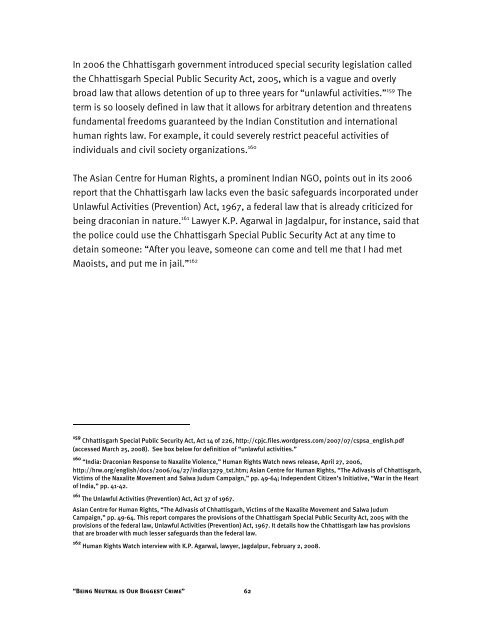âBeing Neutral is Our Biggest Crimeâ - Global Coalition to Protect ...
âBeing Neutral is Our Biggest Crimeâ - Global Coalition to Protect ...
âBeing Neutral is Our Biggest Crimeâ - Global Coalition to Protect ...
Create successful ePaper yourself
Turn your PDF publications into a flip-book with our unique Google optimized e-Paper software.
In 2006 the Chhatt<strong>is</strong>garh government introduced special security leg<strong>is</strong>lation called<br />
the Chhatt<strong>is</strong>garh Special Public Security Act, 2005, which <strong>is</strong> a vague and overly<br />
broad law that allows detention of up <strong>to</strong> three years for “unlawful activities.” 159 The<br />
term <strong>is</strong> so loosely defined in law that it allows for arbitrary detention and threatens<br />
fundamental freedoms guaranteed by the Indian Constitution and international<br />
human rights law. For example, it could severely restrict peaceful activities of<br />
individuals and civil society organizations. 160<br />
The Asian Centre for Human Rights, a prominent Indian NGO, points out in its 2006<br />
report that the Chhatt<strong>is</strong>garh law lacks even the basic safeguards incorporated under<br />
Unlawful Activities (Prevention) Act, 1967, a federal law that <strong>is</strong> already criticized for<br />
being draconian in nature. 161 Lawyer K.P. Agarwal in Jagdalpur, for instance, said that<br />
the police could use the Chhatt<strong>is</strong>garh Special Public Security Act at any time <strong>to</strong><br />
detain someone: “After you leave, someone can come and tell me that I had met<br />
Mao<strong>is</strong>ts, and put me in jail.” 162<br />
159 Chhatt<strong>is</strong>garh Special Public Security Act, Act 14 of 226, http://cpjc.files.wordpress.com/2007/07/cspsa_engl<strong>is</strong>h.pdf<br />
(accessed March 25, 2008). See box below for definition of “unlawful activities.”<br />
160 “India: Draconian Response <strong>to</strong> Naxalite Violence,” Human Rights Watch news release, April 27, 2006,<br />
http://hrw.org/engl<strong>is</strong>h/docs/2006/04/27/india13279_txt.htm; Asian Centre for Human Rights, “The Adivas<strong>is</strong> of Chhatt<strong>is</strong>garh,<br />
Victims of the Naxalite Movement and Salwa Judum Campaign,” pp. 49-64; Independent Citizen’s Initiative, “War in the Heart<br />
of India,” pp. 41-42.<br />
161 The Unlawful Activities (Prevention) Act, Act 37 of 1967.<br />
Asian Centre for Human Rights, “The Adivas<strong>is</strong> of Chhatt<strong>is</strong>garh, Victims of the Naxalite Movement and Salwa Judum<br />
Campaign,” pp. 49-64. Th<strong>is</strong> report compares the prov<strong>is</strong>ions of the Chhatt<strong>is</strong>garh Special Public Security Act, 2005 with the<br />
prov<strong>is</strong>ions of the federal law, Unlawful Activities (Prevention) Act, 1967. It details how the Chhatt<strong>is</strong>garh law has prov<strong>is</strong>ions<br />
that are broader with much lesser safeguards than the federal law.<br />
162 Human Rights Watch interview with K.P. Agarwal, lawyer, Jagdalpur, February 2, 2008.<br />
“Being <strong>Neutral</strong> <strong>is</strong> <strong>Our</strong> <strong>Biggest</strong> Crime” 62
















